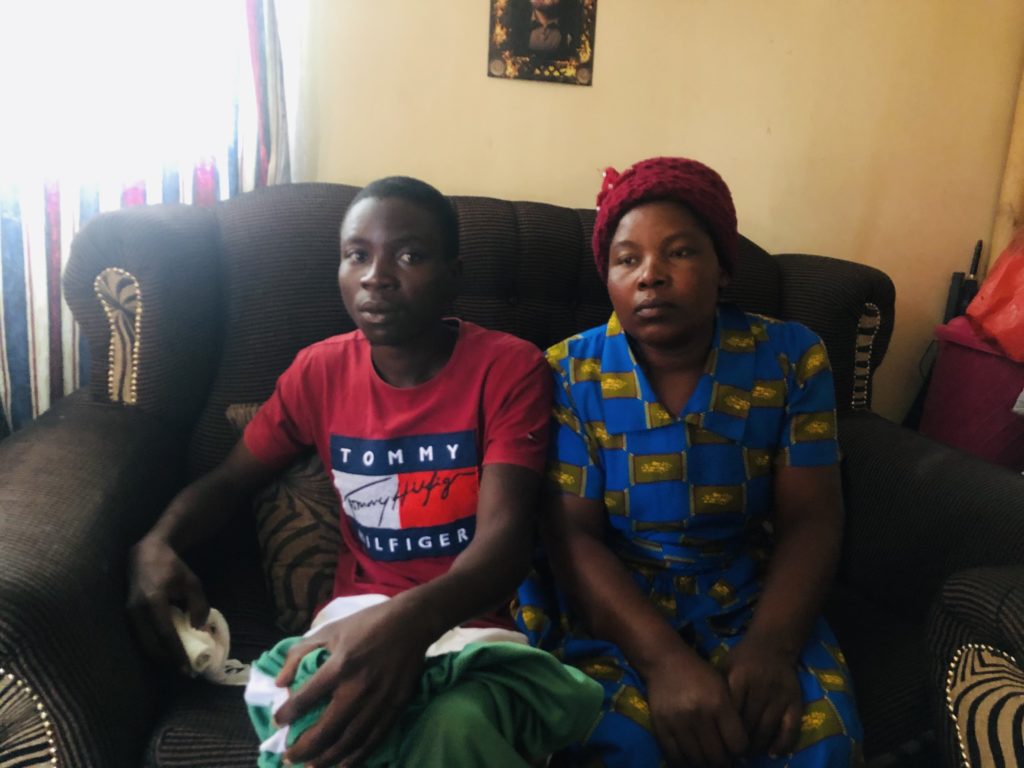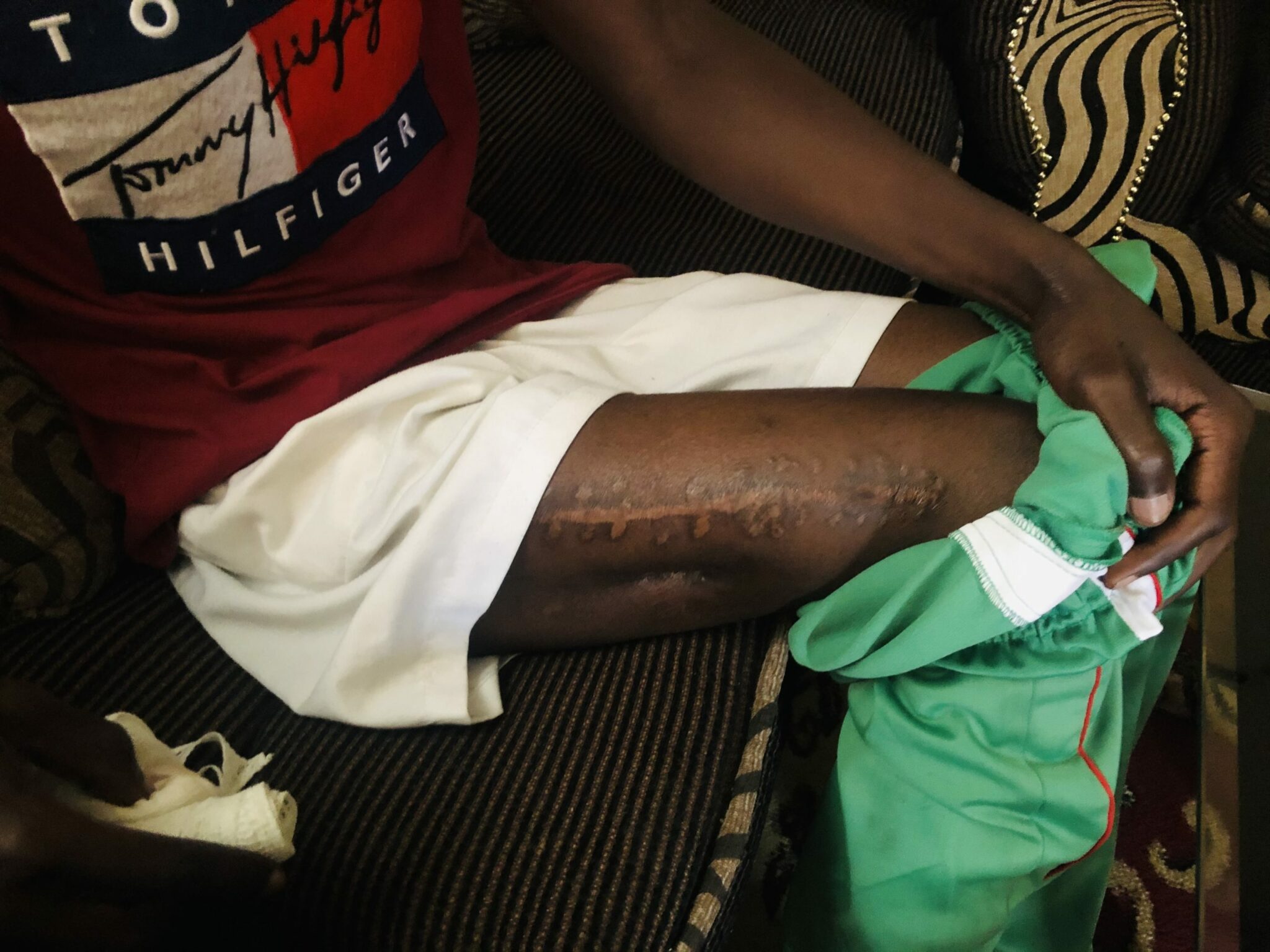A former Zimbabwe National Army (ZNA) officer who was allegedly injured during training and subsequently discharged without any benefits is seeking financial assistance to undergo an urgent surgical operation on his right thigh.
Fortune Tshuma (23) joined the ZNA in March 2017 but around mid July that same year, he sustained serious injuries during training, which he has not fully recovered from and needs an emergency sequestrum operation.
A sequestrum operation will fix a piece of dead bone on his right thigh (femur) that became separated from his normal bone.
Tshuma needs just over US$1 000 to undergo the operation and the wound which measures almost 30cm is causing him serious discomfort as it is oozing puss and requires daily care.

The army discharged Tshuma on medical grounds in January 2020 and reportedly claimed it is was no longer liable for his treatment or medical bills, leaving him in serious pain – physically and emotionally.
His plight also reveals the challenges faced by those who incur injuries while in the army.
CITE caught up with Tshuma at his home in Magwegwe West, where he stays with his mother, Fadzai Tshuma (39) who is struggling to make ends meet.

“I was injured during training at Llewellin Barracks (now called Lookout Masuku Barracks) and developed fractures, I’m not sure which particular activity caused the injury as there were so many. After the fractures, it was established that I had broken some bones on my right femur. I was admitted to Mpilo Central Hospital, where a specialist doctor performed a surgical operation and inserted a K nail (a metal rod) inside my left,” he said, noting that at that time, all the bills were paid by ZNA.
Tshuma said after that operation, the army had to back squad him to allow him time to heal.
Unfortunately he developed an infection and his healing process took longer than expected, which is why he has to undergo the surgical operation
“In January 2020, I was discharged without being told of any compensation since I was still on medical treatment. I’m failing to make a living due to this injury as I face limitations. Since then I have been in pain,” he said.
“I can hardly sleep. When I work hard, I feel the pain or the operation bursts. I can barely lift a bucket of water or walk long distances. Most of my surviving skills are based on hard labour, which I am unable to do because of my injury.”
Tshuma also wrote a letter to the ZNA KGVI headquarters in Harare in October 2020 but no reply came his way.
“Before I was discharged ZNA qualified doctors examined and approved that I was fit to join the organisation. After being discharged I was deprived of medial file and my signal of discharge which is contrary to the terms of Section 16 (1) of the Constitution on Public Service for Employees/ Police/ Prisons and Defence Statutory Instrument Regulations of 2000 that I must be given my termination letter upon discharge or contact termination,” he said.
He also claimed he was discharged in January with one female trainee who had also incurred injuries.
Tshuma’s mother, who was visibly distressed, fumed that the army had even refused to give them his medical files, which contained his medical history.
“Initially when he was first admitted at Mpilo, the army did not notify me my son was injured. My son is the one who called me. When I went to see him at the hospital, the officers asked who had told me. I told them I stumbled upon him by chance as I was there to see a nephew of mine,” she said
She also said when she wanted to have him placed in her care, the ZNA refused and said her son was “a property of the army.”
“Now that same army cannot take care of their property but dumped him. How am I supposed to take care of him. I have another child and we live with my young sibling. I work at a non-profit organisation that looks after mentally handicapped children I barely make a lot of money and I am the breadwinner, at least if my son was able to fend for himself it would be better,” she said
Contacted for comment ZNA spokesperson Lieutenant Colonel, Elphious Makotore asked for the questions to be sent to his email.
His brief response to the email was that the army was consulting stakeholders to gather background information on the matter.
“We acknowledge receipt of your email on the above subject. Please be informed that we are working on gathering all the background information from stakeholders and will respond soonest,” read the email response.


You may want read this.
Reference is made to your enquiry on the injury of recruit Fortune Tshuma. In your e-mail letter of 03 March 2021 and Online edition of 06 March 2021, you wrote to us and went on to publish a story titled “Injured Army Recruit Appeals for Financial Assist to Undergo Surgery”. Our initial response was that we were carrying out thorough investigations on the matter. You however went on to publish the story before getting an official response from us. Your story erroneously insinuates that the ZNA neglected in taking care of the injured recruit. You chose to sensationalise the case in the media instead of advising the affected individual to seek medical attention from the relevant Army authorities.
Regarding administrative management of injured recruits in the ZNA, the procedures are religiously followed. In this particular case, rehabilitation processes for the first stage was done accordingly and the member managed to get medical rehabilitation in time. This was meant to restore members former condition through treatment, surgery and physiotherapy among other procedures. All the costs for the medical attention rendered were paid for by the ZNA.
The ZNA took full responsibility because Fortune Tshuma was indeed injured while on training. The sequence of events was as follows; Tshuma was attended to by the Senior Medical Officer (SMO) of 1 Referral Hospital on 01 July 2017. After realising that the injury required specialist attention, the SMO immediately referred him to Mpilo Central Hospital where a diagnosis of a fractured mid shaft right femur was made.
Tshuma underwent surgery in which K-nails were inserted into the fractured bone. The recruit was later discharged back to 1 Referral Hospital on 19 July 2017 where he remained under the care of the SMO.
It is the ZNA policy that when a member sustains an injury, a medical board must be convened to determine the degree of the injury. A medical board was duly convened on 24 October 2017 and it found out that the affected leg had shortened and had developed a chronic sinus that continuously discharged puss, that is, chronic osteomyelitis, in medical parlance. It was also discovered that the affected limb showed weakening of the femur.
Based on the above findings, the board awarded Tshuma a 27 percent disability arising from the shortened limb and weakened femur. The board further recommended the removal of the member from training as his condition could no longer sustain any strenuous exercises. All the medical bills incurred at Mpilo Central Hospital were wholly paid by the ZNA. On discharge from the ZNA the members next of kin were thoroughly briefed to monitor the members medical rehabilitation programme. They were also told to report back to 1 Referral Hospital if any complications arose.
It has also been observed that Tshuma in his efforts to get assistance never came back to 1 Referral Hospital. There is a possibility that he consulted the wrong office most probably a very junior Regimental Officer who could have been ignorant of the procedures to be followed when handling such medical cases, resulting in him not getting the correct assistance. Ideally, he should have gone back to 1 Referral Hospital to consult with medical personnel where he was initially treated for assistance.
The ZNA is seriously looking into Tshumas case and we are very much concerned about his condition. He is advised to report back to 1 Referral Hospital where he will get all the necessary attention and assistance. His next of kin must also get in touch with Army medical authorities at the earliest possible time.